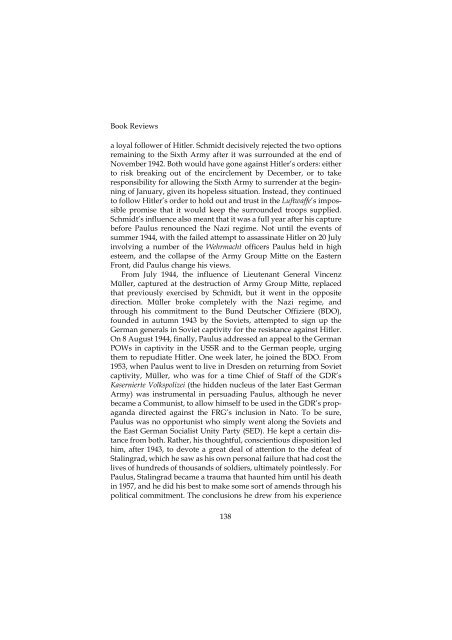Download - German Historical Institute London
Download - German Historical Institute London
Download - German Historical Institute London
Create successful ePaper yourself
Turn your PDF publications into a flip-book with our unique Google optimized e-Paper software.
Book Reviews<br />
a loyal follower of Hitler. Schmidt decisively rejected the two options<br />
remaining to the Sixth Army after it was surrounded at the end of<br />
November 1942. Both would have gone against Hitler’s orders: either<br />
to risk breaking out of the encirclement by December, or to take<br />
responsibility for allowing the Sixth Army to surrender at the beginning<br />
of January, given its hopeless situation. Instead, they continued<br />
to follow Hitler’s order to hold out and trust in the Luftwaffe’s impossible<br />
promise that it would keep the surrounded troops supplied.<br />
Schmidt’s influence also meant that it was a full year after his capture<br />
before Paulus renounced the Nazi regime. Not until the events of<br />
summer 1944, with the failed attempt to assassinate Hitler on 20 July<br />
involving a number of the Wehrmacht officers Paulus held in high<br />
esteem, and the collapse of the Army Group Mitte on the Eastern<br />
Front, did Paulus change his views.<br />
From July 1944, the influence of Lieutenant General Vincenz<br />
Müller, captured at the destruction of Army Group Mitte, replaced<br />
that previously exercised by Schmidt, but it went in the opposite<br />
direction. Müller broke completely with the Nazi regime, and<br />
through his commitment to the Bund Deutscher Offiziere (BDO),<br />
founded in autumn 1943 by the Soviets, attempted to sign up the<br />
<strong>German</strong> generals in Soviet captivity for the resistance against Hitler.<br />
On 8 August 1944, finally, Paulus addressed an appeal to the <strong>German</strong><br />
POWs in captivity in the USSR and to the <strong>German</strong> people, urging<br />
them to repudiate Hitler. One week later, he joined the BDO. From<br />
1953, when Paulus went to live in Dresden on returning from Soviet<br />
captivity, Müller, who was for a time Chief of Staff of the GDR’s<br />
Kasernierte Volkspolizei (the hidden nucleus of the later East <strong>German</strong><br />
Army) was instrumental in persuading Paulus, although he never<br />
became a Communist, to allow himself to be used in the GDR’s propaganda<br />
directed against the FRG’s inclusion in Nato. To be sure,<br />
Paulus was no opportunist who simply went along the Soviets and<br />
the East <strong>German</strong> Socialist Unity Party (SED). He kept a certain distance<br />
from both. Rather, his thoughtful, conscientious disposition led<br />
him, after 1943, to devote a great deal of attention to the defeat of<br />
Stalingrad, which he saw as his own personal failure that had cost the<br />
lives of hundreds of thousands of soldiers, ultimately pointlessly. For<br />
Paulus, Stalingrad became a trauma that haunted him until his death<br />
in 1957, and he did his best to make some sort of amends through his<br />
political commitment. The conclusions he drew from his experience<br />
138













